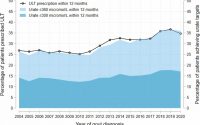Heart attack: The vitamin deficiency ‘doubling’ your risk of a deadly incident
Heart attack: Experts claim a vegan diet can 'help prevent' them
We use your sign-up to provide content in ways you’ve consented to and to improve our understanding of you. This may include adverts from us and 3rd parties based on our understanding. You can unsubscribe at any time. More info
Heart attacks present few warning signs before they strike, adding to their deadly nature. An incident occurs when blood flow to the heart becomes obstructed, depriving the vital organ of oxygen. The condition usually results from years of poor dietary and lifestyle choices that gradually contribute to the narrowing of arteries. Superintendent Pharmacist Hussain Adbeh from Medicine Direct, explains that underlying vitamin deficiency could hike the risk of an incident.
Growing evidence points to vitamin D deficiency as a risk factor for a host of diseases affecting the cardiovascular system.
The nutrient acts like a hormone, helping regulate more than 200 genes throughout the body.
According to Hopkins Medicine, some of its functions include keeping abnormal cells from multiplying, regulating blood pressure and regulating blood sugar.
“Vitamin D’s link to heart health has never been entirely clear.
READ MORE: Heart attack: The type of food that could worsen your risk of the deadly condition

“However, research has indicated that a vitamin d deficiency may be linked to heart disease and an increased risk of hypertension,” explained Mr Abdeh.
“The increased risk of heart attacks may be due to the associated conditions caused by vitamin D deficiency.
“Both heart disease and high blood pressure increase the risk of heart attacks in people whether they have enough vitamin D or not.
“There, vitamin D deficiency may increase this risk further still.
“Nonetheless, it has not been proven that taking vitamin D supplements can lower the risk of having a heart attack.
Although current evidence is scarce, an increasing number of studies are pointing to the link between vitamin D deficiency and increased risk of a heart attack.
Mr Abdeh continued: “Several researchers have found evidence to show that people with low vitamin D levels were doubly likely to experience a heart attack than those who had adequate levels of vitamin D.”
Vitamin D deficiency is rife in countries around the world, particularly those deprived of regular sunlight.

The nutrient is often dubbed the sunshine vitamin because it is turned into D3 through the action of sunlight, before being carried to the liver where it is transformed into active vitamin D.
Suboptimal levels can lead to a cascade of complications if left untreated, including rickets.
This is because vitamin D is central to bone metabolism and protects against respiratory diseases too.
The United Kingdom has exceptionally low levels of vitamin D, which experts are trying to rectify by putting forward calls to fortify foods.

In fact, a survey in the UK shows that about “one in five adults and about one in five children in the UK have low vitamin D levels,” explains the website patient.info.
“More people have low vitamin d levels in the winter and spring because of less exposure to sunlight.”
When vitamin D can’t be sourced from sunlight, it must be found in food, with eggs, fish, all deemed good sources.
Supplements are occasionally recommended for those who are severely deficient.
Source: Read Full Article


